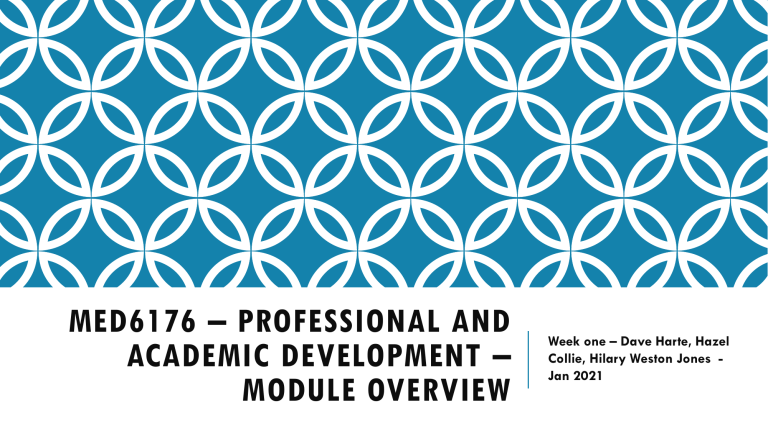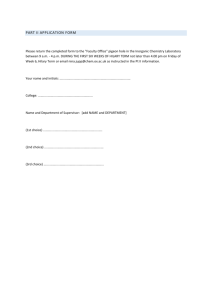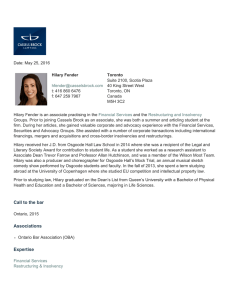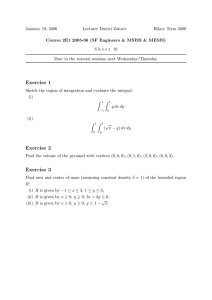MED6176 Module Overview: Professional & Academic Development
advertisement

MED6176 – PROFESSIONAL AND ACADEMIC DEVELOPMENT – MODULE OVERVIEW Week one – Dave Harte, Hazel Collie, Hilary Weston Jones Jan 2021 AIMS OF THIS SESSION To provide you with an overview of the module content, schedule and teaching team - Hilary To provide you with an overview of the assignment - Dave To introduce you to the theme of working in the creative industries - Hazel To provide you with an overview of the support around employability which is available to you in your final year - Hilary QUESTIONS AND CHAT If you have any questions as we go through, please put these in the chat bar which we will check regularly throughout this session. We will also remain online for 20 minutes after our session to talk with you and answer questions. MODULE OVERVIEW Hilary Weston Jones AIMS OF MED6176 The aim of this module is to prepare you for the world of work. You will receive practical advice and be introduced to relevant theories in order for you to develop as a media worker in 2021. You will be asked to reflect on what it means to be a media worker and to demonstrate your readiness for the world of work. You will be asked to reflect on your years of academic studies and practical activities. We will be addressing some of the particular challenges facing media workers in the time of COVID. THE LEARNING OUTCOMES 1. Reflect on the skills needed to be successful as a media worker in the context of challenges facing media organisations. 2. Critically evaluate and articulate professional opportunities for career development within the media and creative industries. HOW WILL WE DO THIS? We will deliver weekly online lectures alternating between small group sessions and entire cohort sessions. Each lecture will include an activity and you will be set selfdirected study. We will be hearing from guest ranging from Industry Experts and Alumni. Moodle will provide you with support material. Invites will be sent out via Teams. OVERALL SCHEDULE – ALL ONLINE Entire cohort sessions – alternate Thursdays between 10.00 am and 12.00 pm Groups B & E sessions – alternate Thursdays between 9.00 am and 12.00 pm. Groups D & F sessions – alternate Thursdays between 1.00 pm and 4.00 pm WEEKLY SCHEDULE – ONE TO SIX Week 1 - Module and Assignment Overview and Introduction to Creative Industries Week 2 - What is the Media Industry in the time of COVID? Week 3 - Media Industries and Organisational Structures Week 4 - New Ways of Working in the Media and How to Stay Motivated Week 5 - Exploitation, Rights and Unions Week 6 - Alumni Stories and Interview Techniques WEEKLY SCHEDULE – SEVEN TO TWELVE Week 7 - Communicating expertise, social media use and professional identity in cultural, media and creative industry work. Networking and promoting yourself Week 8 - How to be a Freelancer Week 9 - Mind the Gap – Taking Stock and Moving Forward EASTER BREAK Week 10 - Assignment Help Week 11 - Tutorials Week 12 - Assignment submission will be no earlier than week 12, confirmation before beginning of week three. TEACHING STAFF AND GROUP LEADERS Group A – tbc if required Group B – Dr Faye Davies Group C – Dr Hazel Collie Group D – tbc if required Group E – Dr Jerome Turner Group F – Dr Matt Grimes Entire Cohort sessions and Module Lead – Hilary Weston Jones THE ASSIGNMENT Dave Harte HOW TO GET 100% IN THE ASSIGNMENT FOR THIS MODULE Produce a report* about the following: What are the contemporary challenges facing the media and creative industries? What is your plan to develop your career given these challenges? *Your report could be a written report, a video, an audio recording, an audio slideshow, a website…. PLANNING YOUR RESPONSE 1. BRAINSTORMING: Do some thinking about the challenges facing the sector. inclusivity and diversity, diversification of business models, new working practices, shifting audience consumption practices, emerging business models, new content commissioning processes, sustainability and climate change, the impact of social and digital technologies Example – sustainability and climate change: The television and film industry is facing issues related to sustainability and climate change, both in terms of the need to make productions more environmentally friendly by creating a lower carbon footprint, and also by making programmes that draw attention to issues of climate change. wearealbert.org Example – shifting audience consumption practices (and business models, and issues of activism and alternative media practices): The local newspaper has traditionally acted a platform through which ordinary citizens were represented and power could be held to account. However, declining advertising revenues and readership has resulted in local news isn’t that local anymore and readers are getting their (mis)information from dodgy Facebook groups. 2. STATEMENT: How does this challenge connect to your own ambitions? “I’m concerned about environmental issues as much as anyone else and I have noticed that there is more coverage of these issues in lots of different kinds of television programmes. Such issues are even changing the way the industry works on a day-to-day basis. I think a good way to get ahead in the TV industry is to demonstrate not only that I care about the environment but that I have really good ideas for programmes on these issues and that I am already across how the industry is adapting itself to reduce its carbon footprint.” Make a connection between the values you have and the career ambitions you have for yourself. 3. RESEARCH: Gather some evidence. Issue: Working as a freelancer in the creative industries can be precarious (irregular work, non-unionised, can be difficult to access support at times of crisis – eg: COVID). Statement: “I recognise that working as a freelancer can be a good way to experience lots of different aspects of the TV industry, build my skills, and build a network of contacts. However, I worry about getting enough work and being treated fairly. I feel that freelancers are such an essential part of this sector they should be better valued.” Secondary research (finding what others have written about this issue) Academic research Industry research Primary research (your own research with people affected by, or commentating on, the issue; or your own experience of it) Interviews with media workers Your own experiences from placements 4. REFLECTION: Consider your own skills and route into work. creativeaccess.org.uk Identify your career path. nationalcareers.service.gov.uk/job-categories/creative-and-media targetcareers.co.uk/career-sectors/media 4. REFLECTION: Consider your own skills and route into work. Present evidence of your suitability for this career path 5. REPORT: Turn your planning and preparation into your report. Introduction •Your 'statement' is a strong justification of the issue and why it matters. Critical Evaluation Reflection Conclusion •A mini-essay outlining the issue, drawing on a range of primary and secondary research sources. •An overview of your skills and your plans to find work, drawing on examples and testimonials. •Connecting the issue you explored to your career plans. Output format report (3000 words) OR video (circa 8-12 mins) OR website (varies) OR audio (circa 12-15 mins) OR Anything else appropriate HOW TO GET 100% IN THE ASSIGNMENT FOR THIS MODULE Demonstrates a highly developed understanding of the chosen challenge and offers insightful evaluation of the sector’s reaction and response. Includes substantial academic and industry research, including primary research. Offers a detailed evaluation of future development opportunities and an honest and mature evaluation of existing and new skills. Indicates that you are highly strategic and reflective in your approach to career planning and development. It’s clear that your ambitions yet achievable plans are underpinned by thorough and appropriate industry research. WHAT TO DO NEXT Read the assessment guide on Moodle. Begin stage one of the process… WORKING IN THE CREATIVE INDUSTRIES Hazel Collie HELP AND SUPPORT AVAILABLE TO YOU Hilary Weston Jones ADM CAREERS + - AFTER YOU GRADUATE Help and support you with your job search. Offer support after gradation. Will hear more from them in Week 4. www.careersplus@bcu.ac.uk OUR MOODLE PAGE The Module Resources section on Moodle includes: An introductory video from ADM Careers + and a link to booking an appointment List of useful media and creative industry websites List of useful websites for job searches List relevant LinkedIn Learning Courses Graduate Profiles List of useful databases for job searches SCHOOL OF MEDIA Continued access to Job Book after you graduate. Regular communications to our graduates promoting opportunities. Media Mentoring Scheme. Your Lecturers – stay in touch! BCU SCHEMES STEM Up Scheme open to all 3rd years and graduates to help you obtain new skills identified by completing a skills audit. After analysing the results you will be invited to attend online workshops to help you develop new skills. Mentoring Schemes We run various mentoring schemes where you can be linked up to someone working in your area of interest. They will offer you support during your job search and early stages of your career. These schemes are both free. For more information email hilary.westonjones@bcu.ac.uk NEXT WEEK – THURSDAY 4 TH FEBRUARY, 10.00 AM TO 12.00 PM • What is the Media Industry in the time of COVID? • What has it’s impact been? • What does the future look like for you? • Are there any positives?


